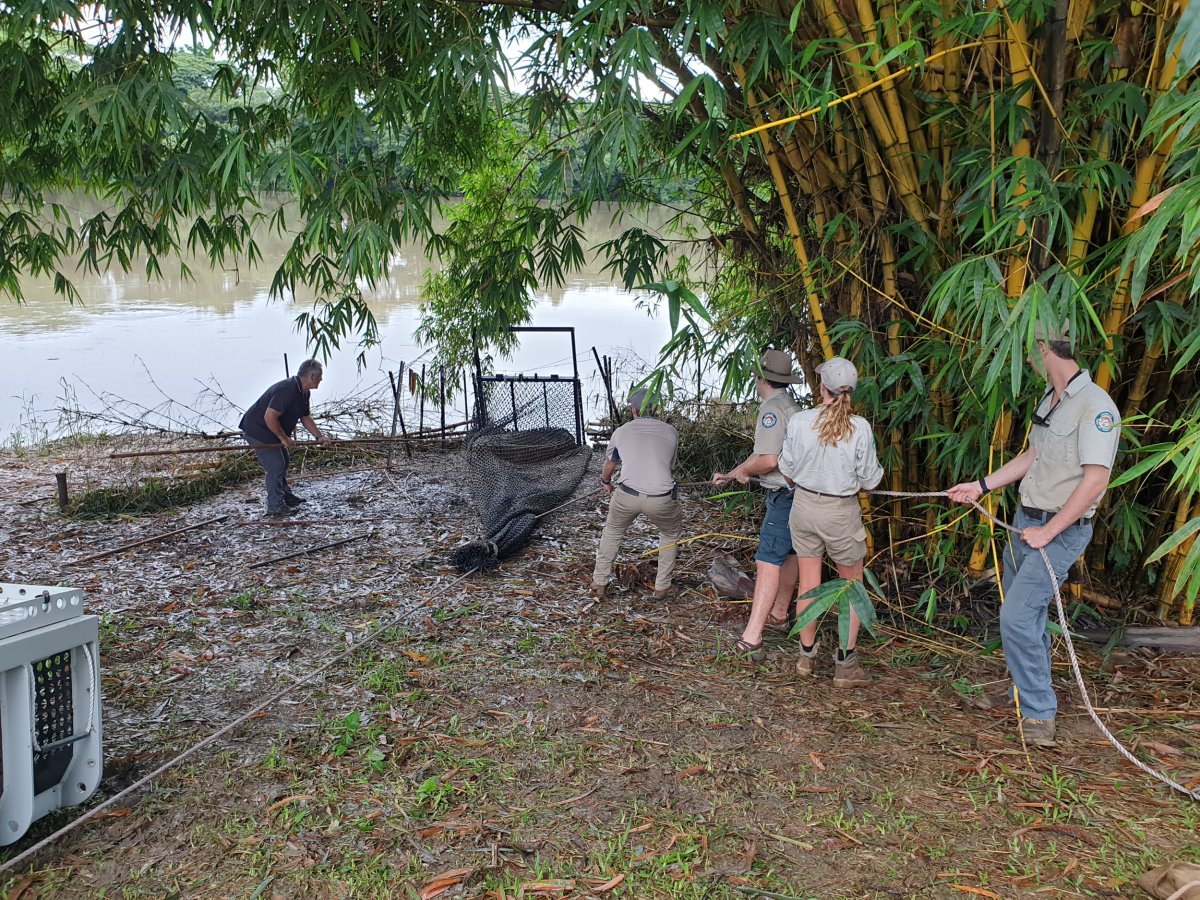A gargantuan crocodile that terrorized locals for months has finally been captured by authorities.
The 14.1-foot-long crocodile had been stalking around the town of Cordelia in Australia’s north Queensland for several months, menacingly following domestic and farm animals and eating chickens.
The croc was captured on the banks of the Herbert River on Sunday, having been declared a dangerous animal by local authorities.
“He started to come for us and stalk us on the riverbank here,” Lawrence Perticato, who lives on the Herbert River in Cordelia, told ABC North Qld. “I’ve lived on the river all my life and have become accustomed to crocodiles, and I know when there’s a dangerous one.”
“With this guy stalking us the way he has been, it’s become very concerning,” he said. “I do a lot of fishing here in the river and haven’t been able to put my boat in because it’s just too dangerous.”
Queensland Department of Environment, Science and Innovation
Perticato eventually contacted the Queensland Department of Environment, Science and Innovation, which spent over a month attempting to capture the animal.
The crocodile was likely a saltwater crocodile, found in estuaries and rivers across the Indo-Pacific region, primarily in India, Southeast Asia, and Australia. They are the largest species of crocodile, growing up to 20 feet long. Around 1,000 people are estimated to have been killed by these crocodiles worldwide.
There are roughly 200,000 saltwater crocs across Australia, but the country sees relatively few attacks: one person is attacked across the country annually on average, with three deaths having been recorded in Australia since 2018.
“Wildlife officers investigate every sighting report, and when we observed the behavior of the crocodile, we targeted it for removal from the wild,” senior wildlife officer Tony Frisby said in a Department of Environment, Science and Innovation statement. “We tried an in-river floating trap but due to the amount of rainfall and elevated river levels, we had to install a gated trap, which is a trap that rests on the riverbank.”
Eventually, the trap captured the crocodile on Sunday. The crocodile was not happy to find itself indentured, making a lot of noise as officers came to remove it from the location.
“He was not very thrilled,” wildlife officer Ella Meeve told ABC North Qld. “He was very vocal—there were a lot of growls and bellows.”
“We are all very relieved that we have now removed that animal,” Meeve said. “If people were to walk too close to the water, it could have been bad news.”
This comes at the same time as a 10-foot crocodile was trapped on the banks of the Ross River in Townsville.
“The crocodile on the Ross River had also been hanging around the weir for several weeks and it was targeted for removal from the wild due to its behavior and risk it posed to public safety,” Frisby said.
Both of these crocs will end up in a zoo or a wildlife sanctuary.

Queensland Department of Environment, Science and Innovation
“People must understand that the removal of these crocodiles does not make the Herbert River or the Ross River safer,” Frisby said. “The Townsville region is Croc Country, and people should be Crocwise by making sensible choices around waterways and avoiding complacency.”
“People need to be aware that they are responsible for their own safety in Croc Country, and should expect crocodiles in all waterways, even if there are no signs there,” he said.
The Department of Environment, Science and Innovation advises people living near waterways in areas where crocodiles are common to steer well clear of the water, and never feed crocs or leave food or fish scraps near the water’s edge. They also advise only swimming during the day and in clear water, even in the sea, as saltwater crocodiles can be found in the ocean. Croc traps should be avoided, as should using small watercraft like kayaks.
“Avoid using small watercraft such as kayaks, paddleboards in croc country. The smaller the vessel, the greater the risk—crocodiles have taken people from small vessels,” they advise.
Do you have a tip on a science story that Newsweek should be covering? Do you have a question about crocodiles? Let us know via [email protected].
Uncommon Knowledge
Newsweek is committed to challenging conventional wisdom and finding connections in the search for common ground.
Newsweek is committed to challenging conventional wisdom and finding connections in the search for common ground.


